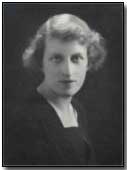Prose & Poetry - Winifred Holtby
 Novelist, journalist, pacifist, and
feminist, whose best-known novel South Riding (1936) won posthumously
the 1936 James Tait Black Memorial Prize. It was partly based on
Holtby's (1898-1935) experiences as a teacher and her childhood memories and
experiences in the East Riding. Holtby's name is inseparably linked
with Vera Brittain's, who described their partnership in her memoir
Testament of Friendship (1940).
Novelist, journalist, pacifist, and
feminist, whose best-known novel South Riding (1936) won posthumously
the 1936 James Tait Black Memorial Prize. It was partly based on
Holtby's (1898-1935) experiences as a teacher and her childhood memories and
experiences in the East Riding. Holtby's name is inseparably linked
with Vera Brittain's, who described their partnership in her memoir
Testament of Friendship (1940).
Winifred Holtby was born in Rudston, Yorkshire, as the youngest daughter of David Holtby, a farmer, and Alice Winn, who became the first woman alderman in the East Riding County Council. In her early childhood she developed love for the Yorkshire countryside and later portrayed its people and landscape in her fiction. Due to her father's ill health, the household was mostly run by Winifred's mother. She encouraged her daughter to write poetry and had her first collection printed - as a surprise - when Winifred was just 13.
In 1909 Holtby entered Queen Margaret's School in Scarborough where she wrote for the school magazine. She enrolled in 1917 in Somerville College, Oxford, but broke off her university career to work in a London nursing home and serve as a volunteer in the Signal Unit of the Women's Auxiliary Corps. She was posted in France in 1918 and returned next year to Oxford, where she finished her history studies. At Oxford she met Vera Brittain, with whom she shared in London a flat with a tortoise.
After graduating Holtby worked as a journalist, writing for the Manchester Guardian, Daily Express, Evening Standard, Good Housekeeping, and the News Chronicle. In 1926 she became director of Time and Tide, a feminist weekly. Her first novel, Anderby Wold, appeared in 1923. In addition to her writing, Holtby devoted herself to social causes and international questions. She helped Labour Party candidates, lectured on women's rights for the League of Nations Union and Six Point Group. In 1929 Holtby published A New Voter's Guide to Party Programmes, directed for women after they got in 1928 the right to vote in Great Britain - 22 years after Finnish women, who were granted the vote in 1906, the first in Europe.
In 1926 Holtby spend six months in South Africa, where she learned about the conditions of native South Africans and spoke for the unionization of black workers. Her observations of racism found their way to the novel Mandoa, Mandoa! (1933). In the story, set in a fictitious African state, Holtby satirized the unfortunate British travel industry. The Astonishing Island (1933) was also satirical and examined contemporary English customs and ways of life.
The protagonists in Holtby's novels were often strong-willed and courageous, whose struggle reflected her own experiences and feminist views, like the social crusader of Poor Caroline (1931) or the heroine from Land of Green Ginger (1927) who rises above her oppressive farmhouse surroundings. Holtby's other works include a critical study of Virginia Woolf (1932), Women in a Changing Civilization (1934), a historical study, and a play, Take Back Your Freedom, with an anti-Fascist theme. It was revised and completed by Norman Ginsbury and first produced in 1940. Holtby's correspondence with Vera Brittain was collected in Letters to a Friend (1937).
Holtby suffered from a heart condition, which gradually diminished her energy. When she collapsed in 1932 she was told it was exhaustion due to overwork. After a second collapse she was diagnosed as having Bright's disease (a kidney disease). Holtby died on 29 September 1935, but managed to complete South Riding. It was published with the help of Vera Brittain, her literary executor, although Holtby's mother did not approve its portrayal of herself and her work as a county councillor. South Riding was set in a fictional part of Yorkshire and offered a panoramic view of the author's native county and its people. Among its wide array of characters were Sarah Burton, the newly arrived and enterprising headmistress of the local girl's school, Mrs Beddows, a wise alderwoman, modelled after Holtby's mother, and Robert Carne, a gentleman-farmer with whom Sarah falls in love. The story was filmed in 1937 (dir. by Victor Saville, starring Ralph Richardson, Edna Best, Edmund Gwenn, Ann Todd), and later also serialised for television.
Article contributed by Petri Liukkonen, website Author's Calendar.
German losses at Messines were 25,000, of which 7,500 were taken prisoner. British casualties were 17,000 killed or wounded.
- Did you know?
